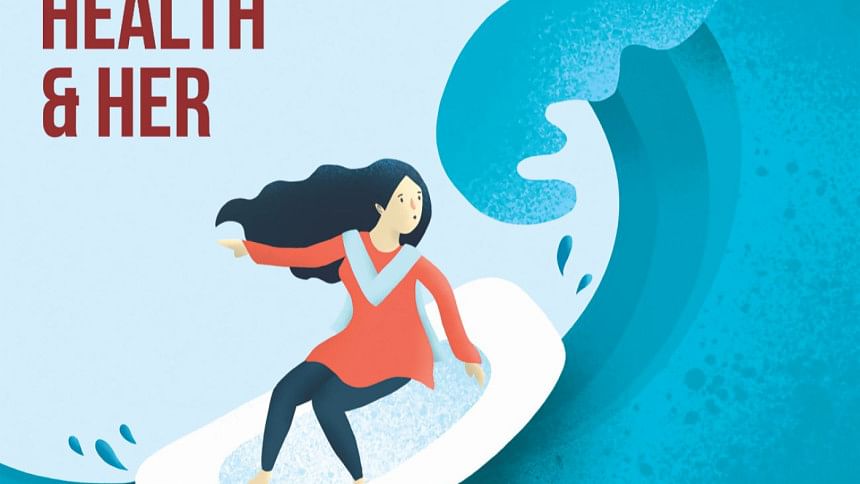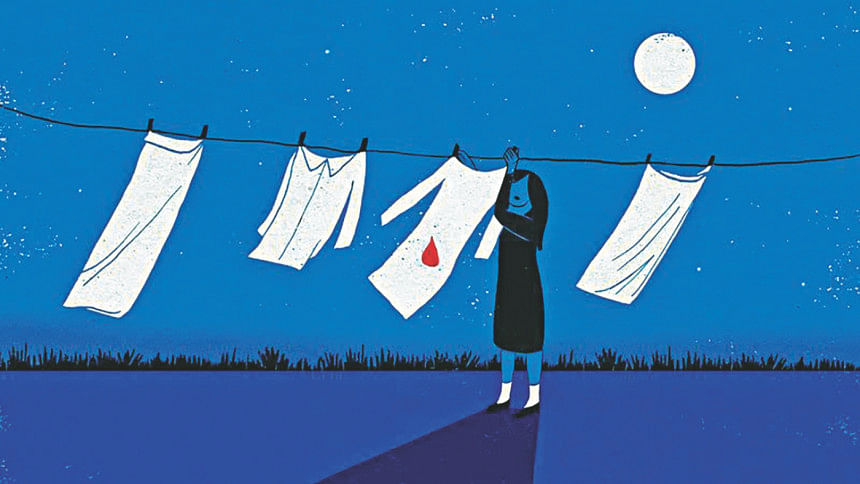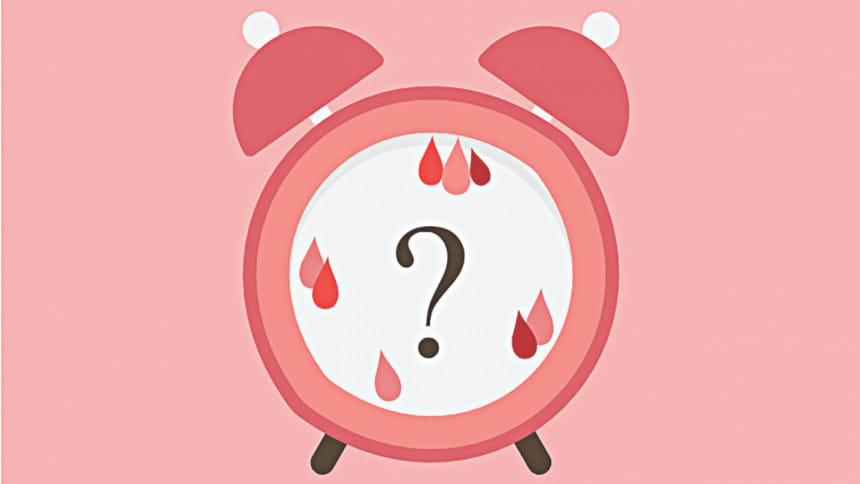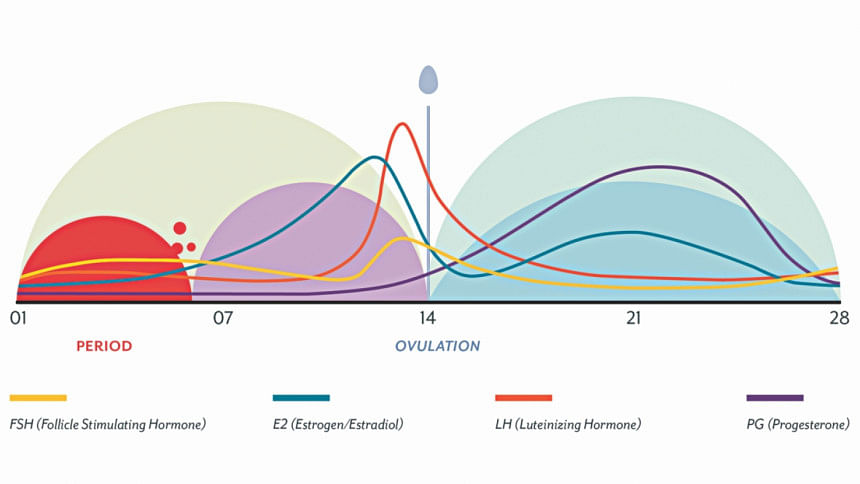HEALTH & HER

The taboo that surrounds menstruation today and the stigma that surrounds the simplest and most natural concept ever known to man is a tale woven through centuries. Even in 2019, most women are not allowed to speak of this monthly predicament or utter the "ominous" word before any man, even if it is only their father or brother. It is quite ironic; given the "taboo" itself is why women procreate and the reason why our race did not perish at the onset of evolution.
Whilst many of us are aware of the term itself, most of us are not educated sufficiently. Menstruation is basically the discharge of blood, uterine lining, mucus lining of the vagina, red blood cells, and old cellular tissue. Now, the reason women get their periods is because of their menstrual cycle, which is simply a consequence of the rise and fall of hormones. The uterine lining is thickened with blood vessels in preparation of possible pregnancy. When pregnancy does not occur, the lining sheds itself, accompanied by bleeding for 3 to 7 days. The menstrual cycle starts on the first day of one period till the first day of the next period, lasting 21 to 35 days. Usually, girls aged between 12 and 15 get their period for the first time. Under normal circumstances, menstruation stops after menopause—the stoppage of menstrual cycle—which usually occurs between 45 and 55 years of age.

There are girls whose families may have rather liberal attitude towards menstruation, but they themselves have a very sceptic approach to it. Again, it has to be remembered that girls not only socialise with families and relatives. There are other girls who have been brought up under different circumstances, who may think of menstruation as this unspeakable phenomenon. It is no wonder given the innate societal animosity harboured in most of us against it for ages now.
Mahfuza Rahman, 19, a naturalised UAE citizen who lives in Dubai, details her struggles within her own home, "In my house, menstruation is a topic that is not discussed openly. Women in my family talk about periods in hushed whispers or in euphemisms. Although I'm privileged enough to have access to sanitary pads, it is sad that I cannot talk about a bodily function openly because of the stigma around it."
Samiha Nuzhat, 18, who has just completed her A Levels has better experiences with her family. "Periods may not be widely discussed among us but it is not viewed shamefully. My mother often discusses it in euphemisms light-heartedly, taking the unnecessary gravity out of it. My father once cleaned out my trash when my mother was out of town. It really is not as much of a taboo among us," she says.
Many girls in our society find it necessary to keep it a secret from their brothers. In this regard, eighteen-year-old Touhid Islam mentions, "Growing up with two sisters, I always saw them struggling to hide their periods from me. When I was mature enough to understand what it was all about, I tried my best to normalise it among us. I constantly reminded them it's nothing to be embarrassed about."
However, with time and the growing social-media awareness, people are becoming more open to discussions about menstruation. There are many edutainment videos about menstruation on social media and YouTube, which have proven to be rather effective over time. The media has also been keen to normalising menstruation through publicity of sanitary pads using red liquid instead of blue.
But, what still many of us lack is the knowledge of the feminine issues and diseases that happen due to hormonal imbalances.

Polycystic Ovary Syndrome
Let's start off with one of the most common hormonal medical condition among reproductive-aged women these days: Polycystic Ovary Syndrome, more commonly known as PCOS. According to medical reports, more than 10 percent of women worldwide are born with this syndrome and only becomes evident when their menstruation cycle kicks in for the first time. PCOS causes women to have an overproduction of androgen testosterone as well as enlarged ovaries containing multiple small follicles which results in polycystic ovaries. And the worst part is it can only be contained, not entirely cured.
Women with PCOS suffer from menstrual irregularities. The excessive emission of androgen can cause weight gain, abdominal fat and resistance to insulin. On top of that, women with this hormonal imbalance have severe risk factors of diabetes and cardiovascular diseases.
There is a possibility of this disease in case there is family history as well, meaning genes can influence the occurrence of PCOS. Alisha Noor recalls her story of being diagnosed with PCOS last year, "The doctors had been guessing it for a long time, but all the symptoms checked out last year. A lot of women on my father's side already have this. So it was kind of expected. From the beginning of when I hit puberty, periods had always been more difficult for me than it normally is for other girls."

However, the biggest risk factor for women with PCOS is infertility. This encapsulates from lack of ovulation. And in some severe cases it gets even worse with the chances of miscarriages shooting upward. "This condition makes women more infertile. I have three members in my family who have PCOS and had suffered miscarriages because of it. And me having it as well, the likelihood of going through something similar really frightens me to my very core," says Alisha.
Doctors suggest that a healthy diet and light exercise on a regular basis can minimise the damages. Weight control can help restore normal period cycles to some extent and ease off the health complications. General treatment for PCOS starts with diagnosing and treating the prevalent symptoms. Furthermore, doctors work on correcting irregular bleeding from the uterus, restoring fertility, improving the improving the skin manifestations of androgen excess and preventing diabetes and cardiovascular disease.
Women, in general are entitled to special care during their menstruation cycles. It takes a huge toll on their physical performance and drains them mentally as well. Fahmina Ahmed Papia, 21, who also has PCOS, comments, "I think they should get some special care. It's tough to deal with all by myself as the disease is not curable yet. We need to balance our hormones by taking medicines, doing exercises and maintaining healthy diet. And these things aren't possible without some mental and financial support," says Fahmina. "But unfortunately, women do not get even the required treatment sometimes, let alone the extra care. People, especially those in rural area, don't have any idea of PCOS and don't have the proper treatment facilities. And the medicines for PCOS treatment are super costly. This is something that needs price regulation, since PCOS is turning into a very common disease."
Endometriosis
This is a yet another medical condition of women that is connected to hormonal imbalance and their menstruation cycle. This disease is present among three to ten percent of all women in the reproductive age. Women are diagnosed with endometriosis when the tissue that makes up their uterine lining—the lining of the womb—is present in other body organs as well. But, in most cases, it's found in the lower abdomen or in the pelvis area. They also pain during other biological activities, especially during pregnancy. In contrast, it's also possible that some women with endometriosis may never face these symptoms at all.
There are several ideas and ways that a woman can get this condition. One very common way of getting endometriosis is when a teenager gets her first ever period. During that time, some of the blood and tissue from her uterus travels through the fallopian tubes and inside the abdominal cavity. This is what the medical experts refer to as "retrograde menstruation". Endometriosis can also spread when a woman undergoes a Caesarean section or C-section. The already pre-existing endometriosis cells can get attached to the abdominal incision. As a result, a woman suffers from severe pain during her period. This happens because when she is going through one of her periodic cycles, the cells and the tissues outside the uterus can also cause bleeding.
Endometriosis can cause infertility in a couple of ways. Firstly, it can cause damage to the fallopian tubes, rendering it incapable of picking up eggs after ovulation. The second possible case of infertility is the result of inflammation around the uterus. According to researches, around 20 to 40 percent of infertile reproductive aged women are diagnosed with endometriosis.
Doctors perform a simple laparoscopy surgery to take a sample lesion of the endometriosis tissue to diagnose this disease. From there on, the medical treatment starts. Unlike PCOS, endometriosis can be completely cured using different medications.
Surgery is the most effective way of treating and curing endometriosis. Patients with this disease then move on to lead a very normal and healthy life too. "I was diagnosed with endometriosis when I was 22. Now I'm 31. I had surgery last year to get the endometriosis lesions removed from my body. I couldn't do it sooner because the required essentials to properly treat this curable disease was unavailable back then. So, I had to take medicines and other endometriosis therapy to keep it under tolerance. I have a 9 to 5 job and things were really hard to tackle prior to my operation. I had to come in for work with unbearable periodic pain. There was really no way of explaining the situation or getting some days off because I couldn't keep asking for that every single month," shares Rumana Kamal*.
Specialists feel that while the facilities of treatment have indeed improved in the past ten years, we still have a long way to go if we want to balance out the psychological and physical aspects. Dr. Ayesha Siddiqua Shatul, a specialist gynaecologist working in Islami Bank Central hospital, says, "Even 8 to 10 years before, women in their 40s would be troubled by hormonal imbalances. But, now it's mostly teenagers who face these issues due to the impossible amount of stress and ignorance. The tests that have to be run are usually pretty expensive, too, which discourages women from getting tested at all. Women are becoming more aware, but we still have a long way to go."
Hormonal imbalance is not a less critical a medical condition that people can remain ignorant to. Everyone, regardless of their gender, should have the basic knowledge of these diseases at the very least. These health complications are enough to ruin a woman's entire life, if not treated properly. It's about time we not only normalise the mention of said topics but also set an example.
*Name has been changed to protect identity
References
http://obgyn.ucla.edu/endometriosis
http://obgyn.ucla.edu/pcos

 For all latest news, follow The Daily Star's Google News channel.
For all latest news, follow The Daily Star's Google News channel. 



Comments